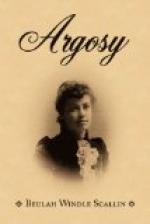Her face brightened. “Then you need not talk about starving,” she said, gaily.
“And, later, I shall have altogether about a thousand a-year. Though I hope it will be very long before it falls to me. Do you think two people might venture to set up at Peacock’s Range, and keep, say, a couple of servants upon four hundred a-year? Could they exist upon it?”
“Oh, dear, yes,” she answered eagerly, quite unconscious of his drift. “Did you mean yourself and some friend?”
He nodded.
“Why, I don’t see how they could spend it all. There’d be no rent to pay. And just think of all the fruit and vegetables in the garden there!”
“Then I take you at your word, Alice,” he cried impulsively, passing his arm round her waist. “You are the ‘friend.’ My dear, I have long wanted to ask you to be my wife, and I did not dare. This place, Leet Hall, encumbered me: for I feared the opposition that I, as its heir, should inevitably meet.”
She drew away from him, with doubting, frightened eyes. Mr. Harry Carradyne brought all the persuasion of his own dancing blue ones to bear upon her. “Surely, Alice, you will not say me nay!”
“I dare not say yes,” she whispered.
“What are you afraid of?”
“Of it altogether; of your friends. Captain Monk would—would—perhaps—turn me out. And there’s Mrs. Carradyne!”
Harry laughed. “Captain Monk can have no right to any voice in my affairs, once he throws me off; he cannot expect to have a finger in everyone’s pie. As to my mother—ah, Alice, unless I am much mistaken, she will welcome you with love.”
Alice burst into tears: emotion was stirring her to its depths. “Please to let it all be for a time,” she pleaded. “If you speak it would be sure to lead to my being turned away.”
“I will let it be for a time, my darling, so far as speaking of it goes: for more reasons than one it may be better. But you are my promised wife, Alice; always recollect that.”
And Mr. Harry Carradyne, bold as a soldier should be, took a few kisses from her unresisting lips to enforce his mandate.
IV.
Some time rolled on, calling for no particular record. Mr. Hamlyn’s West Indian property, which was large and lucrative, had been giving him trouble of late; at least, those who had the care of it gave it, and he was obliged to go over occasionally to see after it in person. Between times he stayed with his wife at Peacock’s Range; or else she joined him in London. Their town residence was in Bryanstone Square; a very pretty house, but not a large one.
It had been an unfavourable autumn; cold and wet. Snow had fallen in November, and the weather continued persistently dull and dreary. One gloomy afternoon towards the close of the year, Mrs. Hamlyn, shivering over her drawing-room fire, rang impatiently for more coal to be piled upon it.




